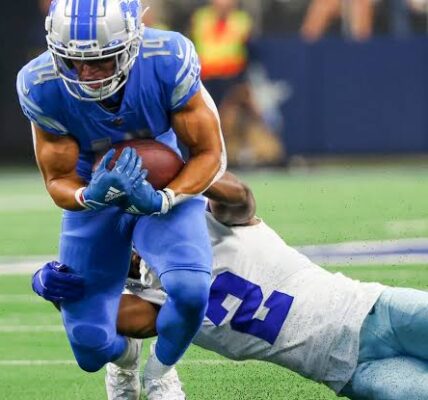Detroit Police Department Launches Internal Affairs Probe After Misinformation About Jameson Williams’ Near Arrest
Investigation into Detroit Police’s Handling of Jameson Williams’ Traffic Stop Uncovers Missteps, DPD Says
The internal affairs investigation into the near arrest of Detroit Lions player Jameson Williams has uncovered multiple failures within the police department, though the probe remains ongoing, authorities stated.
The investigation was triggered by concerns that former Detroit Police Chief James White had been misinformed about a firearm found under Williams’ seat during a traffic stop.
The inquiry, now three weeks old, is focused on whether supervisors intentionally withheld information regarding the gun, which was legally registered to Williams, and whether his status as an NFL player played a role in the decision not to arrest him.
On Thursday, the Detroit Police Department revealed that while the investigation is still in progress, preliminary findings have already shown lapses in protocol.
“Several failures were identified regarding the events of the traffic stop,” said a department spokesperson.
“Any violations of department policy, including those by involved supervisors, will be addressed.”
False Claims About the Guns Found in the Vehicle
The internal affairs investigation centers around the discovery of two guns during the traffic stop involving Williams.
Initial reports suggested that only one firearm, a gun belonging to Williams’ brother, had been found in the back seat of the vehicle.
However, a subsequent review of police body cam footage contradicted this, revealing a second gun – a firearm registered to Williams – was located under his seat.
Additionally, Williams did not have a concealed pistol license (CPL), which would have been required to legally carry the gun in the vehicle.
Cmdr.Michael McGinnis, who is overseeing the investigation, acknowledged that the discovery of two firearms – one of which was within Williams’ reach – changed the situation.
who is overseeing the investigation, acknowledged that the discovery of two firearms – one of which was within Williams’ reach – changed the situation.
“When two guns are found, and one of them is within the wingspan of the passenger and registered to them, the circumstances shift significantly,” McGinnis explained in a previous interview.
The officer who initially pulled over Williams had handcuffed him, planning to take him to the Detroit Detention Center.
However, after a sergeant arrived and contacted supervisors, the decision was made to release Williams without arresting him and to return the gun.
No police report was filed, nor was a warrant submitted to the Wayne County prosecutor’s office at the time.
It wasn’t until October 23, when White became aware of the second firearm, that a warrant request was submitted for review.
Concerns About the Influence of Williams’ Status
Jameson Williams’ status as a Detroit Lions player has raised questions about whether it influenced the decision-making during the traffic stop.
According to sources, Williams’ brother informed police that he had contacted the “head of Detroit Lions security,” though the individual’s identity was not revealed.
The brother is heard on police body cam footage stating, “I’ve got the head of the Detroit Lions security supervisor here on the phone with me, trying to see what’s going on, why you all trying to do that.”
The sergeant at the scene, however, showed no interest in speaking with the Lions employee.
“If they made phone calls, it doesn’t surprise me,” said Steve Dolunt, a former assistant chief with DPD who spent over 30 years with the department.
“People made calls like that all the time when I was there.”
While it is unclear whether the phone call had any bearing on how Williams was treated, the fact that the call was made is now part of the internal affairs investigation.
Investigators are focusing on whether the contact influenced the decision not to arrest Williams, especially since the second gun was found under his seat and he did not have a CPL.
Internal Affairs Looks Into Supervisors’ Actions
The internal investigation also seeks to determine which supervisors were contacted by the sergeant, and why a body camera was turned off during one of the calls.
At one point, after the sergeant made a phone call, his body camera footage stops, which investigators believe could indicate a private conversation that could provide key details about the decision-making process.
According to McGinnis, the fact that body camera footage appears to have been intentionally disabled is troubling.
“We need to understand why the camera was turned off,” McGinnis said. “That’s part of the investigation. All details are being reviewed closely.”
A Former Officer Weighs In on the Situation
Former Assistant Chief Steve Dolunt expressed his belief that if he had been in charge that night, Williams would have been arrested.
“If it had been anyone else, I would have locked them up and taken them in. The circumstances would have warranted that,” Dolunt said.
He emphasized that the officer’s initial decision to cuff Williams and take him in was the correct course of action.
“The officer acted properly at first. But once calls were made and things changed, that’s when it all gets murky.”
In his opinion, the decision not to arrest Williams after discovering the second firearm – especially given that Williams did not have a CPL – could lead to serious questions about how the department handles cases involving high-profile individuals.
Police Chief White Pushes for Transparency
Former Chief White, who is no longer with the department, has emphasized the need for a thorough investigation.
In an interview last week, he stated, “I want this investigation to be concluded as soon as possible.
The department will release the findings, regardless of what they are.”
White’s office had previously been told by subordinates that only one gun – Williams’ brother’s – had been found during the traffic stop.
However, after a closer inspection of the body camera footage, the department learned about the second weapon, which led to the reassessment of the situation.
White, who had been misled by earlier reports, immediately ordered a review of the incident and instructed that a warrant request be submitted.
Lions Organization Comments on the Incident
The Detroit Lions have issued a statement emphasizing that their players are instructed to immediately notify security personnel if they have any interactions with law enforcement.
“This ensures that we get the information directly from the players and can communicate any concerns with the league appropriately,” a Lions spokesperson said.
The team has not commented directly on the specifics of the investigation, but the statement reflects their commitment to handling matters involving players’ interactions with the law in a timely and responsible manner.
The Future of the Investigation and Legal Implications
Once the internal affairs investigation is completed, it will be up to Wayne County Prosecutor Kym Worthy to determine whether to pursue charges, especially after White learned of the second gun.
Some legal experts have suggested that it would be surprising if felony charges were authorized, given the lack of intent to conceal the gun and Williams’ status as a first-time offender.
“If it were just an average person, there’s a good chance they’d face charges for carrying a firearm without a license,” said one legal expert. “But given the unique circumstances here, it’s difficult to predict what will happen next.”
The investigation into the Detroit Police Department’s handling of the traffic stop involving Jameson Williams continues, with many unanswered questions about how the situation was managed.
As the internal affairs inquiry moves forward, more details are expected to emerge, shedding light on whether the actions of the officers and supervisors involved were influenced by Williams’ status as an NFL player, and whether proper protocols were followed.
—




